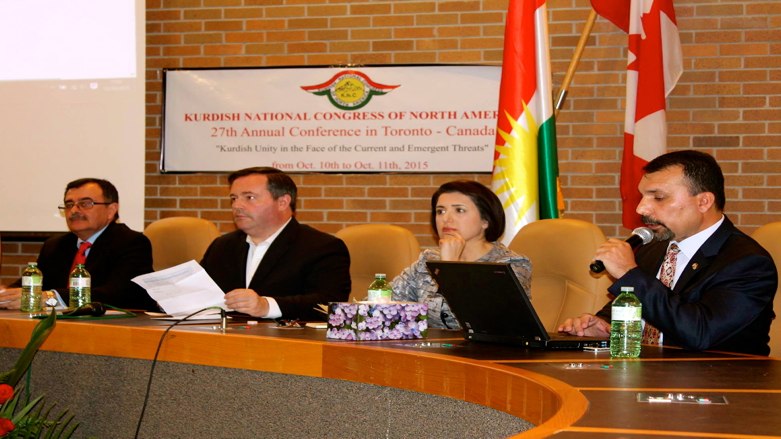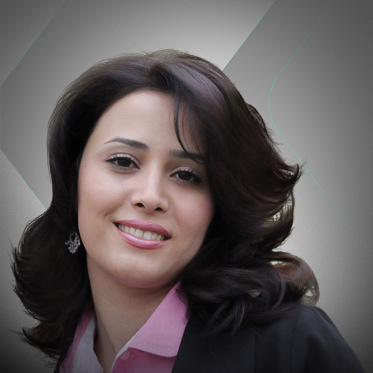Progressing Toward Unity: Present and Emerging Threats for Kurdistan

“Our nation needs us more than ever,” said Nazar Salih, a board member for the Kurdish National Congress of North America (KNCNA), in his opening remarks to the organization's Twenty-Seventh Conference. Held at the North York Civic Center in Toronto this past October 10-11, this year's theme appropriately was “Kurdish unity in the face of present and emergent threats.” Salih urged Kurds to prioritize unity over specific political affiliations and encouraged the audience to deepen their engagement during the Question and Answer period provided after each panel discussion.
Various topics were discussed in four separate panels throughout the conference, including media, human rights, historical and current genocides, and Canadian and Kurdish relations during the two-day conference. Featured presenters for the conference included Canada's Defense Minister, Jason Kenny, the Kurdistan Regional Government (KRG) Representative in Washington, DC, Bayan Sami Abdul Rahman, and the Secretary-General of the Kurdish-Iranian Komala party, Abdullah Mohtadi.
Representatives of several other Kurdish political parties were additionally invited to speak on panels, including Kurdistan Democratic Party (KDP), Patriotic Union of Kurdistan (PUK), and the Kurdistan Democratic Party of Iran (KDPI).
Among the approximately one hundred attendees, only a few Kurds from Syrian or Turkish Kurdistan were present. Nyma Ardalan, a long-standing KNCNA board member told K24 that Nilufer Koc, Co-Chair of the Kurdish National Congress in Europe (KNK) was invited but canceled last minute due to the tragic bombing in Ankara, Turkey that killed more than 100 people, the nation's largest terrorist attack to date. Additionally, as a result of the bombing, many attendees elected not to attend the planned concert at the end of the conference.
Defense Minister Kenny addressed the audience in the afternoon panel and emphasized that, if re-elected, the Conservative party of Canada will continue to support Kurds in combating the so-called Islamic State (IS) in Syria and by opening a Canadian Consulate in the Kurdistan Region of Iraq.
Sartip Kakaee, Vice President of KNCNA who moderated the panel with Kenny, asked him if Canada will put pressure on Turkey, presumed responsible for the Ankara bombing, and highlighted their many human rights violations against Turkish citizens, particularly against its Kurdish minority. Briefly responding, Kenny stated “Canada has called on Turkey” to get back to the peace negotiation with the Kurds but refused to discuss the matter further, exiting through the back door immediately after his speech, and refusing to answer questions posed by the media.
Feeling somewhat sidelined by the international community, Komala's Secretary-General Abdullah Mohtadi noted in his address that “Kurds from Iraq, Turkey and Syria receive international attention but Iranian Kurds are ignored.” He pointed to the increasing rates of execution and dissent since President Hassan Rouhani entered office in 2013.
KRG-USA Representative Bayan Sami Abdul Rahman focused her speech on the 30 percent increase in the Kurdistan Region's population stating that 1.8 million refugees and Internally Displaced Persons (IDP) currently reside in the semi-autonomous region there. She explained that this sudden change has put enormous pressure on the economy, electricity, infrastructure, and almost all aspects of life. “Wealthy countries in Europe have made a big deal of the recent flood of the refugees and call it a crisis while KRG has been under the pressure for over a year," Abdulrahman asserted.
She additionally urged conference participants to their lobby elected officials to send more direct military help to the Kurdish forces, called Peshmerga, in order to effectively fight against IS.“We are grateful to the coalition for the airstrikes, but Peshmerga are in dire need of better equipment [and] Not every Peshmerga has a helmet,” she said.
While the conference provided an important opportunity for open discussions and gathering of Kurds and emphasized the importance of unity for independence, no practical solution was provided or offered as to how this objective may be achieved.
Board members told K24 they were aware of the conferences' shortcomings and stated that financial limitations prevented them from implementing many programs but expressed optimism that next year's conference would be more productive and festive.

